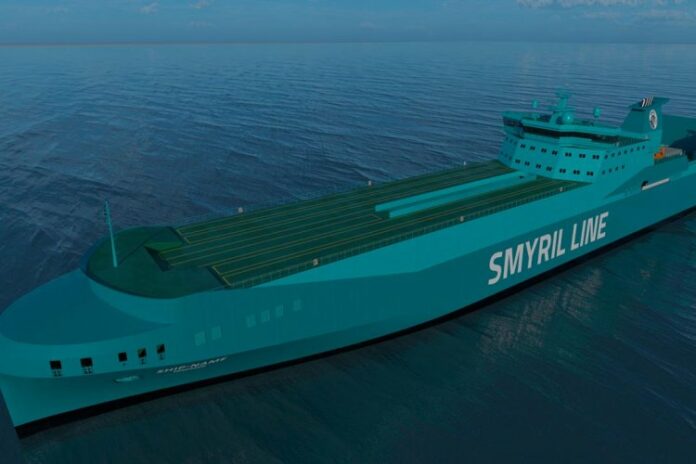Smyril Line has announce that a contract has been made with the CIMC Raffles shipyard in China to build two new cargo ships for the company.
These are two identical RoRo ships, measuring 190 meters in length and having 3,300 lane meters for trailers. The new cargo ships will join Smyril Line’s current network, and they are planned to start sailing in 2026. The ships are designed for optimal year-round seaworthiness in the North Atlantic with great emphasize on our crew comforts and wellbeing on board.
The ships are being designed in close cooperation with KNUD E. HANSEN, naval architects, who, together with the extensive experience of Smyril Line in the North Atlantic, will ensure that the ships are built for the special route between Europe, the Faroe Islands, and Iceland. The ships will be modern and environmentally friendly, meeting all international emission standards. Compared to the company’s existing fleet, they will emit significantly less per transported ton. At the same time, the ships will be equipped with a battery system and the possibility for shore power, which means that port operations can be conducted without emissions. The ships will also be prepared to sail on e-methanol, which is considered to be the best future choice for green energy at Smyril Line.
“Now is the time to set ourselves new and bigger goals towards reducing emissions in the North Atlantic,” says Jens Meinhard Rasmussen, CEO of Smyril Line. “The company’s main goal is to ensure safe and reliable transportation of both passengers and cargo, and to connect the periphery of the North Atlantic with the rest of the world. With the new ships, we emphasize futureproofing and leading the company towards a greener energy solution and lead the way for Smyril Line towards the goals for decarbonization in our fleet renewal, supporting the green transition of the shipping industry.
We will also transport much larger quantities of cargo with less energy consumption than we do now. The energy saving will be at least 60%. This is an important step for us to achieve our goals towards net-zero emissions by 2050, while we can offer our customers an even better service. We have been operating routes in the North Atlantic since 1982. This is not just one of the world’s longest ro-ro and ro-pax routes, but probably also the one with the most challenging sailing conditions. We know from experience that sailing on our route places great demands on both ship and crew, and we have therefore designed the ships with this in mind.”



